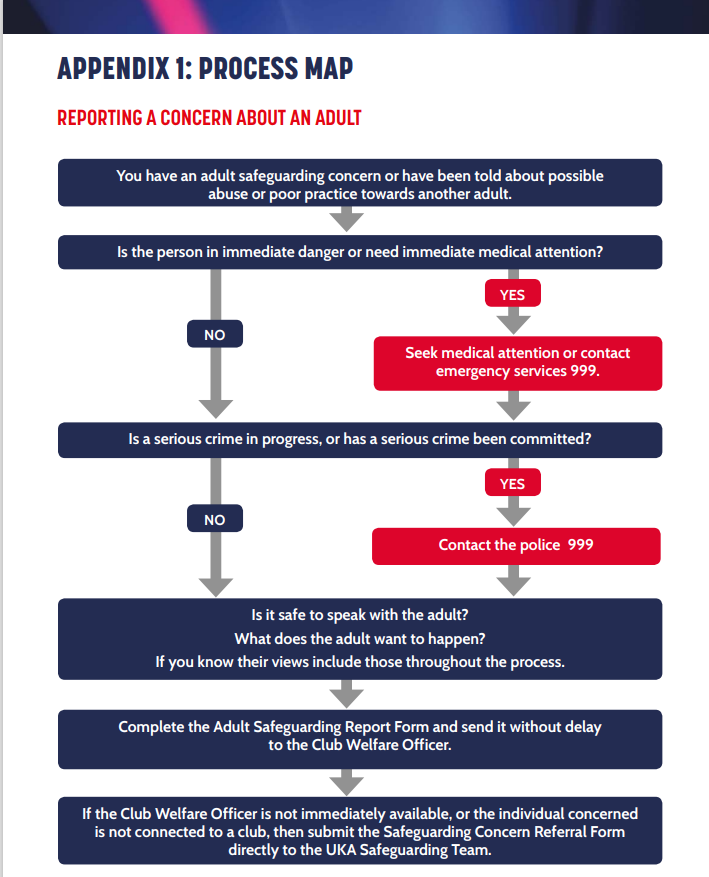Mickleover Running Club
WELFARE POLICY
- 11 January 2026
- adopt the UKA and HCAF Adult Safeguarding Policy and Adult Safeguarding Procedures, and ensure they are displayed prominently on websites and social media pages (*see links below)
- adopt the UKA and HCAF Codes of Conduct and ensure all members have signed to agree to abide by the codes of conduct
- adopt the UKA and HCAF procedures for managing safeguarding concerns
- adopt a disciplinary process for managing misconduct cases
- appoint a minimum of one Welfare Officer in line with UKA guidelines and role description for Club Welfare Officers (Phil Scope and Sarah Bartley)
- ensure that all Run Leaders are recruited safely and are operating appropriately within the club environment (i.e. that they hold appropriate up-to-date qualifications and licences, have undertaken a satisfactory criminal record check, and are adhering to the safeguarding policies, terms and conditions of their licence and the relevant codes of conduct)
- ensure that run leaders attend recommended safeguarding training every three years
- adopt an induction process for new members that includes agreeing and signing up to the codes of conduct, safeguarding policies, discipline policy, anti-bullying policies and other relevant information
- maintain a register of safeguarding training attended and DBS checks completed relevant to club members (RUN LEADERS) and share this register with the HCAF when asked.
- ensure that contact details for Club Welfare Officers and relevant agencies are openly displayed in club environs and on club websites, and made available to anyone who requires them
- ensure that club officers and volunteers act responsibly and set an example to others, especially younger members
- respect the rights, dignity and worth of every club member and others involved in athletics
- challenge and change poor practice
- promote an environment where all concerns can be raised without fear of victimisation or reprisal
- ensure that everyone volunteering or working with adults attends relevant safeguarding training every three years
- implement any recommendations of UK Athletics or the relevant HCAF
- implement effective Adult Safeguarding Policy and Adult Safeguarding Procedures and keep them up to date
- promote safeguarding at the club and encourage good practice
- respond appropriately to safeguarding concerns
- regularly report to the club’s organising committee on safeguarding matters
- ensure that members of the club/volunteers/staff who are working with children and/or adults at risk are recruited safely and in line with legal requirements
- maintain records of safeguarding training attended by club members
- maintain records of club coaches and officials’ licences and criminal record checks
- make sure members are aware of
- how to contact the CWO
- the codes of conduct for working with adults at risk
- how to respond to safeguarding concerns
- deal effectively with breaches of the codes of conduct, poor practice, or allegations of abuse
- keep up to date with developments in safeguarding
- attend the relevant safeguarding courses for the role of CWO
- complete a criminal record check through the relevant Home Country procedures
- maintain confidential records of reported safeguarding concerns and action taken
- liaise with the HCAF Welfare Officer and/or statutory agencies if/when required.
- have an interest in safeguarding and welfare matters
- be friendly and approachable with the ability to communicate well with adults and children
- be willing to challenge opinion, where necessary, and to drive the safeguarding agenda
- have strong listening skills and the ability to deal with sensitive situations with empathy and integrity
- understand the importance of confidentiality and when information may need to be shared to protect the best interests an adult at risk
- have the confidence and ability to manage situations relating to the poor conduct/behaviour of others towards an adult at risk and know when to ask for support.
Safeguarding Code of Conduct
As an affiliated club we have a responsibility to implement and communicate a code of conduct- and as such - see below.
Mickleover Running Club will:
*Additional - Links to EA codes of conduct 2025
Adult-Safeguarding-Policy-2025v2.pdf
Codes-of-Conduct-Booklet-March-2023-1.pdf

Phil Scope
A Club Welfare Officer Phil Scope and Sarah Bartley (CWOs) with the support of the club committee has the responsibility to
PERSON SPECIFICATION It is desirable for a Club Welfare Officer to
Reporting an adult safeguarding concern - click link below
Adult-Safeguarding-Procedures-2023.pdf

